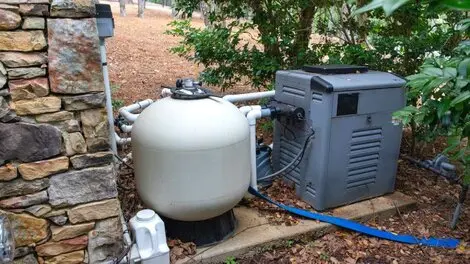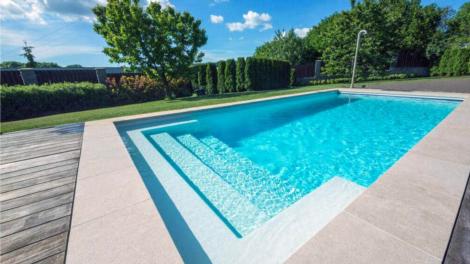Pool heating appliances come in many different types with different working mechanisms, making choosing one challenge.
Australian pool owners commonly use heat pumps. This guide will help you find the ideal option for heating your pool and understand how this appliance works.
How Do Pool Heat Pumps Work?
First, know that pool heat pumps don’t produce heat independently, unlike most conventional gas pool heaters. They draw heat from the surroundings and transfer it to the pool, resulting in a warmer pool water temperature.
Now, let’s look at the steps involved in the heating process:
Step 1: It begins with the pump absorbing naturally heated air via a fan. This air then passes through a coiled evaporator containing a liquid refrigerant.
Step 2: Next, the refrigerant converts into hot gas when the heated air passes through it. It’s then drawn through a compressor, intensifying its temperature by up to 93°C since the hot gas is concentrated.
Step 3: Alternatively, filtered cold water from your pool is pumped into a heat exchanger condenser coil tank. The compressed, heated gas now flows through the heat exchanger, transferring the heat to the cold water in the tank.
Step 4: At this point, the swimming pool water in the tank has a higher temperature and is pumped back into your pool.
Step 5: The process ends with the gas cooling to its liquid refrigerant form inside the condenser coil, which is cycled back into the coiled evaporator for a new heat pump cycle.
An alternative to heat pumps is solar pool heating, which uses solar collectors to absorb heat from the sun and transfer it to the pool water via a heat exchanger.
Choosing The Right Pool Heat Pump
Pool heat pump models can be different from one another, so you should consider the following factors while buying one:
1. Check The COP Rating
The coefficient of performance (COP) is a standard grade that gauges the performance of air conditioners, heat pumps, and refrigerators. It tells you their heat transfer efficiency when analysed against conventional resistance heating.
Do note that you’ll want a heat pump pool heater with a higher COP rating, as it will deliver a more energy-efficient performance.
2. Cheap vs. Costly
Regarding the cost of heat pumps, remember that a cheap option may not always be the best.
In this regard, a common observation is that cheaper units don’t come with inverters, increasing energy costs. The models with inverters will adjust the pump output automatically according to the water temperature so the output will be consistent with the set temperature.
3. Incorporate Solar Power
Combining the heat pump with solar technology will help further reduce energy costs. After all, solar power systems use the sun’s energy during the day.
Installing a smaller heat pump with a solar power system of reasonable size will also not consume much space.
4. Check The Size
As with most technologies, swimming pool heat pumps come in various sizes. You should choose the right size to match your pool.
Remember that small heat pumps won’t adequately heat large pools. At the same time, you wouldn’t want to spend extra on an oversized pump for a small pool.
Some Tips For Maintenance
Here are some simple ways to make the most of a heat pump for your pool:
- Use a blanket or cover for the pool when it’s cold or at night to reduce heat loss.
- Lower the heating temperature for the pool heat pump when you’re not using it to save energy.
- Choose a location where the pump will get good airflow to the outer evaporator air coil for optimal efficiency.
- Regularly maintain the pool pump and keep the area around it clear of debris for proper air circulation.
- Consider an electric pool heater as a supplemental or alternative heating source during cold periods.
Following these tips can help maximise the performance and efficiency of your pool heat pump system.
Let’s Get The Heat On!
Pool heat pumps are different from other heating appliances because they use fewer resources to generate heat, resulting in higher energy efficiency.
So, make your pool cozier by tapping into their benefits today. We’d suggest going through some reliable review guides before making a choice. Also, if you’re still unsure about your needs, it’s best to contact a company dealing in heat pump pool heaters, as they can offer quality advice. If you are in Sydney, contact our professional pool builders and heating specialists at The Pool Co.



